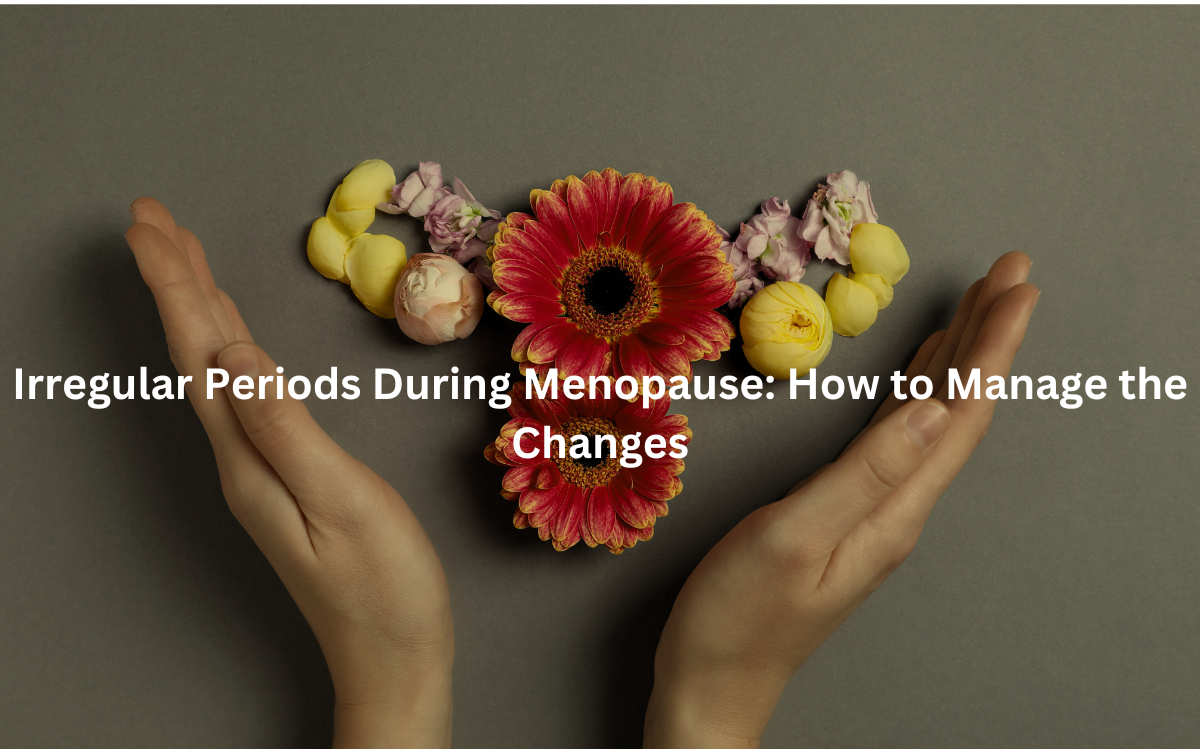Learn effective ways to manage irregular periods during menopause and maintain your health through the transition.
Irregular periods are one of the most common and often frustrating symptoms of menopause. As your body undergoes hormonal changes, menstrual cycles become unpredictable. (1) While this phase is natural, it can be challenging to manage.
Key Takeaways
- Hormonal Replacement Therapy (HRT) and birth control can effectively regulate irregular periods.
- Lifestyle changes, such as diet and exercise, play a crucial role in managing menopause symptoms.
- Understanding the impact of PCOS and managing mental health are key to a smoother menopause transition.
Understanding Irregular Periods During Menopause
Menopause is a natural phase that every woman goes through, typically occurring between the ages of 45 and 55. It marks the end of the menstrual cycle and the reproductive years.
While the transition into menopause can be an empowering time, it can also bring about significant changes to the body, most notably irregular periods. These irregularities may range from skipped periods to heavy bleeding or even spotting between cycles.
Hot flashes, night sweats, and mood swings are commonly known symptoms of menopause, but they can have a profound impact on menstrual cycles as well.
The hormonal fluctuations that come with menopause are responsible for many of these changes, leading to a chaotic and often unpredictable period pattern.
Some women may experience periods that are closer together or farther apart, while others may stop entirely for a few months only to return with heavier flow than before.
Understanding what’s happening during this time can help alleviate the anxiety many women feel when faced with irregular periods. The changes are a part of the body’s natural transition and are usually temporary.
Hormonal Changes and Their Impact on Irregular Periods
Hormonal changes can significantly impact menstrual cycles, particularly as women approach menopause. During this phase, the ovaries gradually stop producing eggs, leading to a decline in estrogen and progesterone—key hormones that regulate the menstrual cycle.
Estrogen is essential for maintaining the thickness of the uterine lining. When its levels drop, the lining may shed unpredictably, resulting in irregular periods. This can manifest as:
- Shorter, lighter, or more spaced-out periods
- Episodes of heavy bleeding
- Occasional spotting
These fluctuations are common as the body adjusts to its changing hormone levels and transitions out of the reproductive years.
Skipped periods are another common symptom, caused by infrequent ovulation. Without ovulation, the body may not produce enough progesterone to trigger the shedding of the uterine lining. In some cases, hormonal imbalances can disrupt the regularity of shedding, creating unpredictable cycles. (2)
While these changes can feel unsettling, they are typically a normal part of the body adapting to its new hormonal balance.
Effective Treatment Options for Managing Irregular Periods

While menopause is a natural phase of life, managing the symptoms—especially irregular periods—can be challenging. Fortunately, there are several treatment options available to help regulate menstrual cycles and ease discomfort.
Hormone Replacement Therapy (HRT)
HRT is often the go-to treatment for women struggling with menopausal symptoms, including irregular periods. By supplementing the body with estrogen (and sometimes progesterone), HRT can help stabilize hormonal levels, which in turn can regulate periods. HRT can be administered in several forms, such as oral tablets, patches, gels, or even vaginal rings.
The key benefit of HRT is its ability to ease symptoms like hot flashes and night sweats while also helping to regulate the menstrual cycle. However, it’s essential to remember that HRT may not be suitable for all women, especially those with a history of breast cancer or blood clots. Consulting a healthcare provider is vital to determine the right course of treatment.
Birth Control Pills
For some women, birth control pills can be an effective way to manage irregular periods before menopause. These pills help regulate hormone levels, which can help control the timing and intensity of menstrual cycles. Women in perimenopause (the phase leading up to menopause) may find that birth control pills help maintain more regular cycles and reduce heavy bleeding or spotting.
While birth control pills are not a long-term solution for menopause, they can provide relief for women who are still in their reproductive years and experiencing irregular periods.
Non-Hormonal Treatments
For women who prefer to avoid hormone therapy or those who cannot take hormones for medical reasons, there are non-hormonal options available. The intrauterine device (IUD) is one such option. The IUD can regulate bleeding by releasing a small amount of progestin (a synthetic form of progesterone) directly into the uterus, helping to control the growth of the uterine lining.
Lifestyle changes can also have a positive impact on managing irregular periods. Maintaining a healthy weight, regular exercise, and a balanced diet can help stabilize hormone levels and reduce stress, which can contribute to menstrual irregularities.
Polycystic Ovary Syndrome (PCOS) and Menopause: A Unique Challenge
Polycystic Ovary Syndrome (PCOS) presents a unique set of challenges for women entering menopause. PCOS, a condition affecting many women of reproductive age, is characterised by irregular periods, acne, and weight gain. As women with PCOS approach menopause, hormonal fluctuations may persist, often continuing to cause irregular menstrual cycles.
This ongoing irregularity is linked to higher-than-normal levels of androgens (male hormones) common in women with PCOS. These elevated androgen levels can disrupt normal ovulation, even during perimenopause, making hormonal regulation more complex.
For women nearing menopause with PCOS, tailored treatment options are crucial. Potential approaches include:
- Hormonal therapies, such as birth control pills or hormone replacement therapy (HRT)
- Individualised plans based on symptoms, age, and overall health history
However, these treatments may not always work as effectively in managing PCOS symptoms compared to women without the condition. A healthcare provider will assess each woman’s unique needs to develop an appropriate strategy for symptom management.
The Role of Birth Control in Menopause Symptom Management
Birth control can serve multiple purposes during the transition to menopause. In the years leading up to menopause, it can help regulate periods, reduce the intensity of hot flashes, and prevent pregnancy. Birth control pills, patches, or the IUD can keep menstrual cycles regular and reduce symptoms like heavy bleeding and cramping.
For women who have already entered menopause, birth control can still be beneficial, particularly in the form of IUDs. An IUD can manage bleeding and prevent pregnancy, especially in women who are still in their early 50s but may not yet be fully menopausal.
For those who don’t want to use hormonal methods, non-hormonal birth control methods, such as sterilisation, can help provide peace of mind and eliminate the risk of unintended pregnancy during this transitional phase.
Health Risks During Menopause: Bone and Heart Health
The decline in oestrogen levels during menopause has far-reaching effects beyond the menstrual cycle, particularly on bone and heart health. Oestrogen plays a crucial role in maintaining bone density. As levels drop, women face a heightened risk of osteoporosis, which can cause bones to thin and become more prone to fractures.
Heart health is also significantly impacted. The loss of oestrogen can lead to:
- Increased levels of LDL cholesterol (the “bad” cholesterol)
- Decreased levels of HDL cholesterol (the “good” cholesterol)
These changes raise the risk of cardiovascular disease after menopause.
To mitigate these risks, adopting a healthy lifestyle is essential. Strategies include:
- Eating a diet rich in calcium and vitamin D
- Engaging in regular weight-bearing exercises
- Considering hormone replacement therapy (HRT) when appropriate
Routine check-ups with a healthcare provider can help monitor both bone density and heart health, ensuring that any issues are addressed early. These proactive measures are key to maintaining overall health during menopause.
Managing Mental Health During Menopause
Menopause isn’t just a physical change—it can also have significant psychological effects. Mood swings, anxiety, and depression are common symptoms. These changes can be exacerbated by hormonal fluctuations, lack of sleep due to night sweats, and stress.
Managing mental health during menopause requires a holistic approach. Cognitive Behavioural Therapy (CBT) can be effective in helping women cope with the emotional changes associated with menopause. Mindfulness and relaxation techniques like yoga or meditation can also help reduce anxiety and improve overall well-being.
Alternative and Complementary Therapies for Menopause
For women who prefer to avoid traditional medical treatments or are looking for complementary options, there are several alternative therapies available.
Herbal remedies such as black cohosh and evening primrose oil have been used for managing hot flashes and other menopausal symptoms, though their efficacy can vary from person to person.
Acupuncture is another alternative therapy that some women find helpful in reducing hot flashes and improving mood. While there is still limited scientific evidence to support these treatments, many women report finding relief through these alternative methods.
However, it’s important to consult with a healthcare provider before starting any alternative therapies to ensure they won’t interfere with other treatments or medical conditions.
Final Thoughts
Menopause is a natural life transition, but that doesn’t make it easy. Irregular periods are just one of many symptoms that can arise during this time, and they often come with their own set of challenges.
From hormonal changes to lifestyle adjustments, there are several ways to manage these symptoms effectively. Whether through hormone replacement therapy, lifestyle changes, or alternative therapies, finding the right treatment is key.
At the end of the day, every woman’s experience with menopause is unique. By staying informed, seeking professional guidance, and being open to different treatment options, women can take control of their health and well-being during this pivotal time in their lives.
Don’t let menopause hold you back—book your consultation with Modern Menopause today and get the support you need.
FAQ
What causes irregular periods during menopause?
Irregular periods during menopause are mainly caused by fluctuating hormone levels, particularly estrogen and progesterone. These hormones regulate the menstrual cycle, and as a woman approaches menopause, their production decreases, leading to unpredictable cycles. This hormonal imbalance results in changes in the frequency, duration, and intensity of periods, sometimes causing heavier or lighter flow.
Can irregular periods signal another underlying condition?
Yes, while irregular periods are a natural part of menopause, they can also indicate other health conditions, such as thyroid disorders, polycystic ovary syndrome (PCOS), or fibroids. If periods become very erratic or if symptoms seem unusual, it’s advisable to consult a healthcare professional for further investigation.
How long can irregular periods last before menopause?
Irregular periods typically begin in the perimenopausal phase, which can start as early as 10 years before menopause. The duration of irregularity varies from woman to woman, but they generally last for about 2–4 years. Some women may experience irregular periods for longer, while others may have shorter periods of fluctuation.
How do lifestyle factors affect menstrual irregularity during menopause?
Lifestyle factors like stress, diet, and exercise can significantly influence menstrual irregularities. High stress levels can exacerbate hormonal fluctuations, leading to more erratic periods. Poor nutrition or excessive weight gain may also impact hormone production. A balanced diet, regular exercise, and stress management can help reduce the severity of symptoms.
Can irregular periods be managed without hormone replacement therapy (HRT)?
Yes, there are several ways to manage irregular periods during menopause without resorting to hormone replacement therapy (HRT). Lifestyle changes like maintaining a healthy diet, managing stress, and staying active can help. Non-hormonal treatments, such as certain medications, supplements like black cohosh, or acupuncture, may also provide symptom relief for some women.
References
- https://pmc.ncbi.nlm.nih.gov/articles/PMC3232023/
- https://pmc.ncbi.nlm.nih.gov/articles/PMC10733621/

Leave a Reply